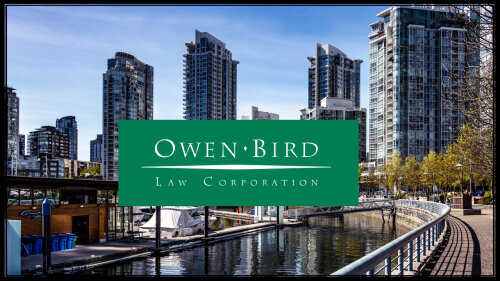Best Retirement Lawyers in Vancouver
Share your needs with us, get contacted by law firms.
Free. Takes 2 min.
List of the best lawyers in Vancouver, Canada
About Retirement Law in Vancouver, Canada
Retirement law in Vancouver, Canada, is primarily determined by federal and provincial legislations, ensuring that each citizen's rights and interests are adequately protected once they reach the age of retirement. These laws regulate various aspects, including the Canada Pension Plan (CPP), Old Age Security (OAS), and the Guaranteed Income Supplement (GIS), as well as an array of registered retirement savings plans. The retirement age in Vancouver, as dictated by these laws, is typically 65, but may be early at 60 or delayed up to 70 depending on individual preferences and circumstances.
Why You May Need a Lawyer
Seeking legal counsel when planning or navigating your retirement may prove beneficial in various situations. These include understanding the implications of early or late retirement, handling pension disputes, or interpreting complex retirement law stipulations. A lawyer could also help with estate planning, including drafting or updating your will, setting up trusts or health directives, ensuring smooth transfer of assets and handling any tax implications. Additionally, if you're considering retiring in Vancouver as an immigrant, a lawyer can guide you through the immigration laws and regulations.
Local Laws Overview
In Vancouver, several key legal frameworks apply to retirement. The Canada Pension Plan Act provides the CPP, a retirement, disability and survivor benefit program which you pay into during your working life. The Old Age Security Act regulates distribution of the OAS pension to seniors, and the Guaranteed Income Supplement is available for low-income residents. The federal Income Tax Act and the provincial Income Tax Act also contain many provisions related to retirement income and savings. These laws can be complex and require professional legal understanding.
Frequently Asked Questions
When can I start receiving my retirement benefits in Vancouver?
The standard age at which you can start receiving the CPP retirement pension is 65, but you may opt to receive it as early as age 60 with a reduction, or defer it up to age 70 for an increase.
What happens if I decide to work after retirement?
If you decide to work after retirement, you can still receive your CPP and OAS benefits. However, your income may impact the amount of benefits received, and tax implications may apply.
Can immigrants receive retirement benefits in Vancouver?
Yes, immigrants may qualify for CPP, but the amount depends on how much and how long they've paid into the system. As for OAS, they must be 65 years old, a Canadian citizen or legal resident, and have lived in Canada for at least 10 years after turning 18.
What is a RRSP and how does it work?
A Registered Retirement Savings Plan (RRSP) is a retirement savings and investing tool for employees and the self-employed in Canada. Contributions to RRSPs are tax deductible, and taxes on the earnings and growth are deferred until you withdraw the funds.
How can a lawyer help me with my retirement planning?
A lawyer can help interpret complex pensions and retirement law, advise on pension disputes, help with estate planning and navigate the potential tax implications of your retirement decisions.
Additional Resources
In addition to seeking legal advice, several resources could prove useful in the retirement planning process. These include the official Government of Canada website, the Canadian Revenue Agency's information on RRSPs and other retirement savings plans, and Vancouver based retirement planning consultancy firms.
Next Steps
If you decide seeking legal help is the right step for you, start by finding a lawyer who specializes in retirement and pension law. It may be beneficial to prepare a list of questions beforehand, and bring any documents you feel could be relevant to your case. Remember that your initial consultation is about both you getting advice, and assessing if the lawyer is the right fit for your needs.
Lawzana helps you find the best lawyers and law firms in Vancouver through a curated and pre-screened list of qualified legal professionals. Our platform offers rankings and detailed profiles of attorneys and law firms, allowing you to compare based on practice areas, including Retirement, experience, and client feedback.
Each profile includes a description of the firm's areas of practice, client reviews, team members and partners, year of establishment, spoken languages, office locations, contact information, social media presence, and any published articles or resources. Most firms on our platform speak English and are experienced in both local and international legal matters.
Get a quote from top-rated law firms in Vancouver, Canada — quickly, securely, and without unnecessary hassle.
Disclaimer:
The information provided on this page is for general informational purposes only and does not constitute legal advice. While we strive to ensure the accuracy and relevance of the content, legal information may change over time, and interpretations of the law can vary. You should always consult with a qualified legal professional for advice specific to your situation.
We disclaim all liability for actions taken or not taken based on the content of this page. If you believe any information is incorrect or outdated, please contact us, and we will review and update it where appropriate.












